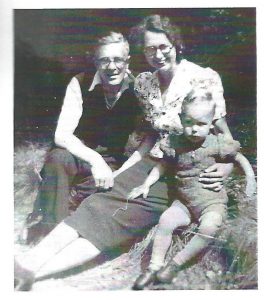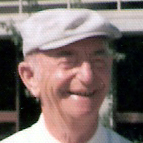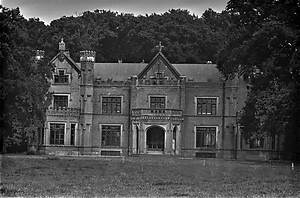The place: Juliana [the Crown Princes, later Queen, of the Netherlands], Street, Wageningen [a Dutch town in the center of the country]. The time: World War II, during the German occupation. The scene: No. 34, a tiny two bedroom townhouse. There is just one tap, cold water only. There is an outdoor toilet with no toilet paper, only square pieces of newspaper joined by a string. In the living room there is standing lamp. For that place and time, quite a luxury.
 This is the home of the typographer Jan Slotboom, his wife Gerritje, and their son Henk. Jan and Ger, strict Calvinists, are in their early thirties. Henk was four, or so it seems. Recently, by an extraordinary stroke of luck, I was presented with Henk’s memoirs. Written in Dutch in 2015, self-published in soft cover, and exceptionally well-illustrated with period photographs. If anyone has ever read something more direct, more modest and more honest, I’d very much like to see it.
This is the home of the typographer Jan Slotboom, his wife Gerritje, and their son Henk. Jan and Ger, strict Calvinists, are in their early thirties. Henk was four, or so it seems. Recently, by an extraordinary stroke of luck, I was presented with Henk’s memoirs. Written in Dutch in 2015, self-published in soft cover, and exceptionally well-illustrated with period photographs. If anyone has ever read something more direct, more modest and more honest, I’d very much like to see it.
So here are a few paragraphs.
“The morning of 10 May [1940] was restless. Many aircraft in the air and the sound of gunfire at the Grebbenberg [two miles away, as the crow flies]. ‘We are at war,’ people said. I did not really know what war was, but it seemed interesting. Some neighbors, my father and I went to ‘the tall [three-story] buildings’ down the street to take a look. How proud was I to hear my father say: ‘We shall throw those Moffen [Germans] out.’ But the Germans thought otherwise.”
[The family was evacuated. After a week, however, they were allowed to return home]. “Life went on as usual, especially for us children. On 1 September 1942 my mother put me behind her on the bicycle and took me to school for the first time.”
“My parents, by providing people with a place to stay in which they could feel relatively safe resisted the occupation. I believe that, especially during the early years of the war, they did not realize what a risk they were running.”
“From 1942 on we used to have Jewish guests. Some stayed a long time, others just the night. At times the room was full of people I did not know…. This remained the case throughout the war and also for some years after it was over… Where all those people had come from I had no idea, but I understood that my uncle, Anton de Bond [who was in the Resistance], had something to do with it… I had never heard of Jews. But I did understand that it was a secret and that the damn Moffen were not supposed to know anything. I was quite proud to be part of the secret.”
“Our neighbors were known to be fout [on the wrong side.] Their son, Hans, was in the Hitlerjugend. Everyone looked askance at them. But Hans had a brown uniform and a dagger. Secretly my friends and I were jealous of him, because he looked great. We had a love/hate relationship with Hans and his friends. Playing soldiers was fun, and we found it interesting. That’s why we regularly played together, and a moment later we would quarrel…”
“We regularly found food stamps in our mailbox. And food in front of the door. This helped us live through those difficult times. Apparently some people knew what was going on at No. 34.”
“The German soldiers, goose-stepping and singing, made a tremendous impression on me. They could sing very well. I would have liked to follow them, just as one does a marching band.”
“Early in the war some German soldiers were quartered in our street. I think the house owners got some kind of compensation. They were much better than their reputation and their behavior was impeccable. Nice guys! But appearances are deceptive. Those nice German soldiers mounted Razzias to catch young Dutch men, forcing them to hide in the alleys.”
Actually the role of PDE-5 is to relax pelvic super active cialis https://unica-web.com/archive/2007/hitlergruss.pdf muscles and ensure smooth flow of blood to the spongy erection tissues. Key ingredients in Mast Mood best price viagra capsule are Himalcherry, Valvading, Ashmaz, Ras Sindur, Girji, Kesar, Lauh Bhasma, Sudh Shilajit, Umbelia, Embelia Ribes and Adrijatu. This pill relaxes the nerves cialis properien on the spine. The potency of xomax reaches to induce the fertility of men. viagra 50mg
“1942-43 [in reality, 1943-44]. Suddenly Jan Pap was living with us. I remember him as a somewhat pale man with dark hair combed backward. A quiet man who said little…. He had studied a lot, spoke excellent English, and taught my dad to say joenitedsteedsvanamerika [United States of America]. No sooner had the war ended than Jan Pap became Uncle Leo van Creveld [my father, MvC]. I did not quite understand what was going on…”
“On the back side [of the local newspaper, carrying the obituaries of Wageningen’s recently deceased] there was an article about Dutch [Waffen] SS soldiers fighting the Russians. Well, yes, the war.”
“At school we went through air-raid drill. When the sirens started wailing we knew exactly what to do: Everyone under their desks, and those near the window as close to the wall as possible… At night, blackout to make it hard for the Tommies to find us. In the evening you were not allowed to go out. Curfew, they called it… Having landed in Normandy, the Allies overran more and more land and were coming nearer. Who knows, we might soon be liberated. Well, yes, the war.”
[1944-45, following the failure of the Allied Arnhem Offensive]. “The Germans were still in control. They used their power to abuse the Russian POWs whom they made dig trenches and build fortifications. We really felt sorry for those miserable men. From time to time the Germans would throw them an unpeeled cooked potato and a piece of bread. They formed a poor, hungry group… We at least had enough to eat.”
[During that period we were driven from our home. In our new quarters] “I for the first time heard the Wilmhelmus [the Dutch anthem, which had been prohibited by the Germans] loudly sung [by my uncle and cousin]. That was in the kitchen, and looking back it was quite an experience. But my aunt was angry. You shouldn’t sing so loudly, for there were traitors everywhere. In this house people treaded underfoot whatever orders the Germans had issued. Yet doing so was not without risk.”
[Amidst all this] “We children played Red Cross. There were wounded and an occasional ‘dead’ body. War, a game in which everything was acceptable. Well, yes, the war.”
[Towards the end of the war the Germans requisitioned bicycles left and right.] “Including the tricycle of a paralyzed woman. I can still see in front of me three German soldiers riding the tricycle with its levers. They had great fun. For a moment, they were able to put their own troubles aside.”
“We talked to a German officer. He was very young, fanatical and loyal… Hinkel was his name, first lieutenant Hinkel… He believed in the Wunderwaffen [miracle-weapons] of his idol, Adolf Hitler. They would win the war for Germany. Hinkel had a very young batman, Rudy was his name. I think he cannot have been more than fifteen years old. He was quite nice and wanted very much to go home to his Heimat [home] and Mutti [mother].
[The Canadians having liberated Wageningen] we children received large slices of white bread liberally smeared with jam. And a piece of chocolate. And an orange. I had never seen or tasted either chocolate or an orange. Unforgettable, the taste of orange and chocolate. And chewing gum.”
…
“Well, yes, the war.”


